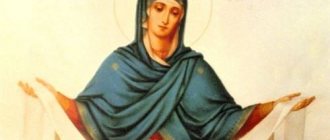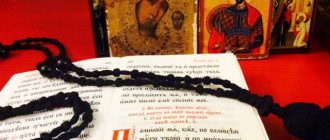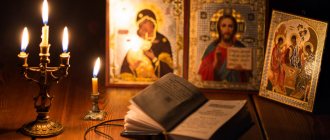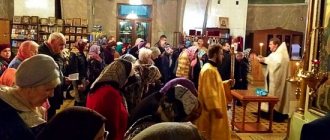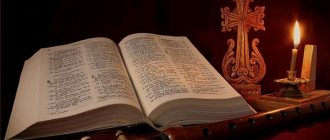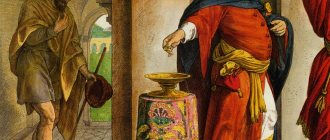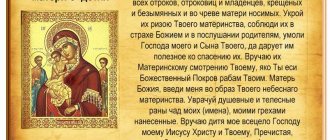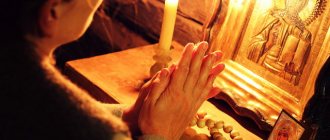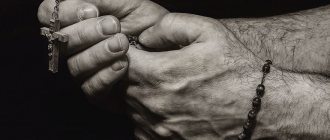Prayers at the end of the 10th Kathisma
Prayers at the end of the 10th kathisma:
KATHISMA 10
| According to the 10th Kathisma, Trisagion according to Our Father | After Kathisma 10 Trisagion according to Our Father |
| The same troparia, tone 6 : I am terrified at the terrible day of Your coming, O Christ, and fear the unwashed judgment, O Lord, I am terrified and tremble, for I have had many sins, but before the end I am merciful. God, convert and save me, my Savior, Most Merciful. | Troparion, tone 6 : I am terrified of the terrible day of Your coming, O Christ, and, fearing the incorruptible judgment seat, Lord, I fear and tremble, for I have many sins. But before the end, as a merciful God, convert and save me, my most merciful Savior. |
| Glory: When thrones are set up for judgment, O Lord, and men appear before Your judgment seat: the king of a warrior will not be preferred, the ruler of a servant will not be preferred: everyone will either be glorified or put to shame by their deeds. | Glory: When the thrones for the Judgment are set, O Lord, and people appear before Your judgment seat, the king will not be preferred to the warrior, the master will not receive advantage over the slave: for each of his deeds will either become famous or be ashamed. |
| And now: Great gifts, Pure Virgin of God, you have been honored, as you gave birth to the flesh of the One of the Trinity, Christ the Giver of Life, for the salvation of our souls. | And now: You, pure Virgin Mother of God, were honored with great gifts, for you gave birth in the flesh to One of the Trinity, Christ the Giver of life, for the salvation of our souls. |
| Lord, have mercy (40 times) and prayer: | |
| Our Lord God, Rich in mercy and Incomprehensible in bounty, One by nature sinless, and for our sakes, except for sin, was a Man, hear at this painful hour my prayer, as a poor and wretched person I am overwhelmed by good deeds, and my heart is troubled within me. For you, the Most High King, Lord of heaven and earth, for all my youth I lived in sins and followed the lusts of my flesh, all the laughter of demons was, all the devil’s followers, I take out in the time of sweets valya Repent, having been darkened by thoughts from infancy, even Until now, I never had the desire to do Your holy will, but I was captivated by the passions that haunted me, laughing and mocking the demons, never even thinking in my mind about the unbearable anger even against sinners. his, and the fiery gehenna lying down. As if from here I fell into despair, and was never in a sense of conversion, I was empty and naked even from Your friendship. What kind of sin have you not committed? What deed has the demon not done? What evil and prodigal act is not done with advantage and diligence? I have desecrated my mind with carnal memories, I have desecrated my body with confusion, I have desecrated my spirit with adversity, I have loved every cursed flesh to serve and work with sin. And who else will not weep for me, wretched one? Who will not weep for me, the condemned? For I alone, Lord, have inflamed Your wrath, I alone have kindled Your anger against me, I alone have created evil before You, having surpassed and conquered all sinners from all ages, having sinned incomparably and unforgiven. But since You are Most Merciful, Compassionate, Lover of mankind, and waiting for human conversion, I cast myself before Your terrible and intolerable judgment, and like Your most pure feet touch, from the depths of my soul I cry to You: cleanse, Lord, forgive, Benefactor, have mercy on my weakness , bow down to my bewilderment, listen to my prayer and do not silence my tears, accept me, the repentant, and convert the erring one, embrace the one who turns and pray for forgiveness. You have not ordained repentance for the righteous, you have not ordained forgiveness for those who do not sin, but you have ordained repentance for me, a sinner, for the wrongdoings of Thy indignation; naked and naked before You I stand, O O Heart. Dear Lord, I confess my sins: for I cannot look up and see the height Heavenly, from the severity of my sins we dance. Enlighten the eyes of my heart and give me tenderness for repentance, and contrition of heart for correction, so that with good hope and true confidence, I will go to that peace, praising and blessing you all-holy Your name, the Father and the Son and the Holy Spirit, now and ever, and forever and ever, amen . | Lord our God, rich in mercy and incomprehensible in compassion, One by nature sinless and for our sake became a man without sin! Hear at this hour this my contrite prayer, for I am poor and poor in good deeds, and my heart within me has become confused. For You know, Almighty King, Lord of heaven and earth, that I wasted all my youth in sins and, following the desires of my flesh, I became a laughing stock for the demons, I followed the devil, always wallowing in the mire of sweets. For, darkened by thoughts from infancy even to this day, I never had the desire to do Thy holy will, but completely captivated by the passions that raped me, I became a laughing stock and a mockery for the demons, not at all keeping in mind the thought of Thy unbearable, terrible wrath on sinners and the prepared them to hell fire. So, having therefore fallen into despair and never coming to a sense of conversion, I suffered deprivation and lost friendship with You. For what kind of sin have I not committed? What demonic work have you not done? What shameful and immoral act have I not committed with abundance and zeal? I have stained my mind with carnal memories, I have polluted my body with shameful intercourse, I have polluted my spirit with consent to evil, I have taught every member of my unfortunate body to serve and work in sins. And who now will not weep for me, the unfortunate one? Who will not weep for me, the condemned? For I alone, Lord, angered Your wrath, I alone kindled Your anger against me, I alone did evil before You, surpassing and defeating all sinners from the ages, having sinned incomparably more and unforgivably. But since You, Lover of Mankind, are many-merciful, compassionate and await the conversion of man, behold, I throw myself before Your terrible and unbearable judgment seat, and as if touching Your most pure feet, from the depths of my soul I cry to You: “Cleanse, Lord, forgive, Unforgiving, have mercy.” my weakness, bow to my bewilderment, heed my prayer and do not remain silent, seeing my tears, accept me, the repentant, and bring back the lost, embrace the one who returns and forgive the one who prays.” For You did not ordain repentance for the righteous, nor did You ordain forgiveness for those who do not sin, but You, a sinner, ordained repentance for what I aroused Your indignation. Naked and naked I stand before You, Lord, Knower of the Heart, confessing my sins, for I cannot look and see the height of heaven, bending under the weight of my sins. Enlighten the eyes of my heart and grant me tenderness for repentance and contrition of heart for correction, so that with good hope and true confidence I may go to the world there, praising and blessing unceasingly Your all-holy name, the Father and the Son and the Holy Spirit, now, and always, and forever and ever. Amen. |
Share:
Kathisma 10 Psalm 71
Psalm 71
About Solomon.
[Psalm of David] According to the inscription of the Slavic Bible, this psalm seems to belong to David and was written by him about Solomon, thus being the king’s prayer for his son, the heir to the throne. In the Hebrew Bible, it bears the inscription of the Psalm of Solomon (the Russian translation is incorrect). From the fact that historical books say nothing about David's dying prayer for Solomon, silence about which case, important in its essence as the will of the Jewish beloved king, is incredible, if only such a fact existed in reality, then from the fact that here the localities of Farsir and Sheba are mentioned, unknown in the time of David, and which became known only under Solomon, when he established lively trade relations with the first (1 Kings X:22; 2 Chronicles IX:21), and from the second the queen came to him (3 Kings X: 1-10) and David, therefore, could not know about them and speak outside the conditions and circumstances of his time, finally, from the fact that, differing in the nature of the reasoning, which the psalms of David do not possess, it bears a great resemblance to the prayer of Solomon at Gibeon (1 Kings III:5-10), one must conclude that the writer of the psalm was Solomon. The psalm itself represents in its content an image of the ideal of a king and reign that Solomon drew for himself and which he would like to realize.
If he prays for himself in the third person, then this is not unusual in the Psalter. For example, David in XVII Ps 21 verse prays for himself in the third person; Psalms 19, 20 were written by him about himself on behalf of the people. The inscription of the 70, attributing this psalm to David, is probably explained by the fact that after this psalm there is a postscript, “David’s prayers are over,” i.e., this psalm ends the collection with the song of David, which is why they replaced the inscription in the sense of “psalm about Solomon." But this postscript cannot be taken literally. In the collections preceding the 70th psalm there are psalms belonging to the sons of Korah (43-48), Asaph (49) and this inscription only indicates the predominant, dominant abundance of the psalms of David in this collection, the latter as a writer a potiori, and not only one thing.
God! Grant the king's son the power to establish truth and peace, so that his reign will be beneficial, as rain is beneficial to the earth (1-6). His kingdom will be eternal and will spread throughout the whole world and over all nations, since he will protect the poor from violence (7-14). They will continually pray for him; his reign will be full of external blessings and all nations will please him (15-17). Blessed be the Lord forever! (18-19).
1 God! Grant judgment to Thy king, and righteousness to Thy king's son, 2 that he may judge Thy people and Thy poor in righteousness in judgment;
1-2. “Court”, “truth” are synonymous expressions, meaning Solomon’s desire to be strictly fair in court cases, making his decisions in accordance with the essence of the case, and not according to any external, random, even if strongly captivating motives. This is, for example, his solution to the controversial case of two harlots (see 1 Kings 3rd chapter). His decisions, as based only on justice, must therefore be impartial: they are the same for all people, both noble and strong, and weak and poor (“poor”).
3 Let the mountains bring peace to men and the hills righteousness; 4 May he judge the poor of the people, may he save the sons of the poor and humble the oppressor, -
3-4. “May the mountains bring peace to people and the hills bring truth” - let peaceful life and justice reign in people’s lives, let everyone feel calm, in the confidence that his truth will always find protection, and the “oppressor” who lives by deception and untruth will receive punishment. “Mountains and hills” - elevated areas, visible far away; let lawfulness reign over everything, as mountains and hills are visible from everywhere. In parallel with Chapter 6. 1-2 tbsp. book the prophet Micah, by mountains and hills one can understand the noble classes of the Jewish people, due to their predominant position, capable of crushing their lower ones. Then the above expression will mean - let the feelings of legality and justice be internalized by the upper class.
5 And they will fear you as long as the sun and the moon remain throughout all generations. 6 He will come down like rain on a mown meadow, like drops that water the earth; 7 In his days the righteous will prosper, and there will be abundance of peace until the moon ceases;
5-7. “As long as the sun and the moon endure throughout all generations.” The sun and moon, surviving generations of people and always unchanged, are symbols of strength and eternity. May the reign of this king be eternal and unchanging, as the sun and moon shine invariably and eternally; let the principles of his reign (legality, peace and justice) pass inviolably from generation to generation, to all generations. Let his reign be as much a sign of Divine favor to the king and people as the fleece was to Gideon; may his reign be as beneficial as rain is beneficial for the flora and fauna. - “The righteous will prosper and there will be an abundance of peace” - let his reign have justice and the fullness of peace (“abundance of peace”) as its predominant, dominant feature.
8 He will possess from sea to sea and from the river to the ends of the earth; 9 The inhabitants of the desert will fall before him, and his enemies will lick the dust; 10 The kings of Tarshish and the islands will give him tribute; the kings of Arabia and Sheba will bring gifts;
8-10. “From sea to sea” - from the Mediterranean Sea, the western border of Palestine, to the “sea”, probably Indian in the east, “from the river”, as the Euphrates is usually called - the northern border of the world then known to the ancient Jew, “to the ends of the earth” - to the extreme, final border of the world from the south. The meaning is - let the kingdom of this king embrace the whole world. - “The inhabitants of the deserts will fall before Him,” that is, wild peoples, independent of any rulers and self-governing tribes. - “Lick the ashes.” The eastern peoples (Assyrians, Egyptians and Hindus) had a custom of kissing the footprints of the ruler on the ground as a sign of special respect. Let the enemies show the king the deepest signs of respect. - “Kings of Tarshish” - Tarshish is a city in Spain, the “islands” are the islands of the Phoenician possessions in the Mediterranean Sea, to the west of Palestine. "Sava" - from Hebrew. Sheva. Some find this area in happy (southern) Arabia (which, due to the parallelism of the opposition of speech, is more likely), others - in Africa, precisely in present-day Abyssinia. Let the power of this king extend not only to the lands of the nations, but also to the nations themselves; let all nations and kings submit to him. Here the geographical points of the east and west are taken as extreme points to depict the countries of the whole world.
11 And all kings will worship him; all nations will serve him; 12 For he will deliver the poor, the crying, and the oppressed, who has no helper. 13 He will be merciful to the poor and needy, and will save the souls of the needy; 14 He will deliver their souls from deceit and violence, and their blood will be precious in his sight; 15 And he will live, and they will give him from the gold of Arabia, and they will pray for him without ceasing, and bless him every day;
12-15. The spread of the rule of this king will be achieved, however, not by conquest, not by violent means, but by peaceful means - the voluntary submission of all peoples to him, due to the consciousness ingrained in them that only his reign is the kingdom of peace and justice.
- “Their blood will be precious in his eyes” - he will protect the righteous from violence and preserve and value their lives (“blood” is the bearer of life), i.e. in his kingdom the righteous will prevail and will dominate. Therefore, the name of this king will always be revered, he will live in the people's memory, they will bring him as a gift Arabian gold, distinguished by its value due to the abundance of nuggets, and day after day they will pray for him and his rule.
16 There will be an abundance of grain on the earth, on the top of the mountains; its fruits will grow like the forest of Lebanon, and people will multiply in the cities like grass on the earth; 17 His name will be [blessed] forever; as long as the sun remains, his name will be transmitted; and in him [all the families of the earth] shall be blessed, all nations shall call him blessed.
16-17. Since the reign of the king will be peaceful and will take possession of all countries and peoples, hostile relations between the latter must cease. All human efforts will then be directed towards the development of a peaceful culture, which will reach such a height that “there will be an abundance of grain at the top of the mountains.” Man will find a way to cultivate the previously bare and barren peaks, where vegetation will appear so valuable in its fruits that it will surpass the rich cedar forests of Lebanon, famous throughout the world as the best material for the construction of ships and which brought significant income to the Jews. - “In the cities people will multiply like grass.” The population in cities under peaceful conditions of existence will increase so that it will be as numerous as grass. - “And they will be blessed in him” - through this king, through the assimilation of the foundations of his reign, well-being (“they will be blessed”) will pass on to all the inhabitants and peoples of the earth.
18 Blessed is the Lord God, the God of Israel, who alone does wonders, 19 and blessed is the name of His glory forever, and the whole earth will be filled with His glory. Amen and amen.
Verses 18-19 do not belong to the writer of the psalm, they represent the addition of the compiler of the collections of songs of the Psalter, which we find at the end of each collection of psalms.
20 The prayers of David the son of Jesse are ended.
Psalm 71, as we said, represents an image of the ideal of a king and reign that Solomon drew for himself and to which he made efforts to possibly approximate. But the famous, historical Solomon had only just begun his reign in the spirit indicated by the psalm. There were no wars under him, the Jews enjoyed external prosperity - each had their own vineyard and their own tent, as well as respect among foreigners; With his judicial decisions he amazed his contemporaries and his name became known throughout the world. In the second half of his life, as is known, he even deserved condemnation from God. And in essence, the ideal depicted here is beyond the capabilities of man in general. The king is depicted as eternal (5 v.), his possessions are the whole earth and peoples (8-11), his kingdom is the full embodiment, the realization of the world (12 and 16). Such a reign can only belong to God. The ideal of the kingdom drawn by Solomon found fulfillment in Jesus Christ, whose teaching is the teaching of love and forgiveness, His kingdom is the kingdom of peace and truth and its purpose is to spread throughout the entire earth and forever.
